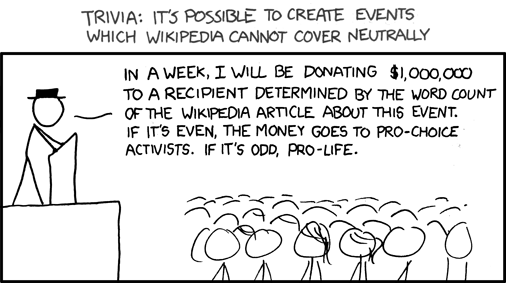
When can Wikipedia be trusted? Well, according to non-profit Wikimedia Foundation, which runs the show, if not now, then soon. According to an August 24th article in the New York Times, Wikipeditors were then in the process of instituting a feature called “flagged revisions,” which requires an "experienced volunteer [Wikipedia] editor" to approve public alterations to articles about living people before those changes go... um, live. Like most message boards worth reading (or, at least, worth not dismissing out of hand), articles won't reflect updates until a moderator gives the nod.
Better refereeing, while perhaps antithetical to the free-for-all origins and explosive growth of the site, is now imperative; in the wake of troubling edits by a variety of self-serving corporations and politicians, and given the site's scope, popularity, influence, and ubiquity. Quoth Michael Snow, Seattle lawyer and chairman of the Wikimedia board: “We are no longer at the point that it is acceptable to throw things at the wall and see what sticks.” Yes: when 60 million Americans a month rely on Wikipedia as a trusted source regarding many subjects beyond the oeuvre of Joss Whedon, time to hold editorial input to a higher standard than the "is my fettucini al dente?" test.
Disclosure! I use Wikipedia. I have Wikipedia in my pocket, thanks to my




Well, I have never watched Buffy the Vampire Slayer. I am so out of date. But I do read newspapers!
ReplyDelete